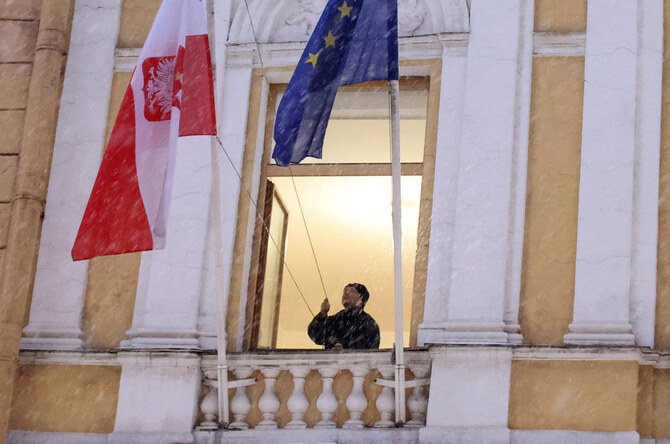WARSAW: Poland announced Wednesday it had shut its consulate in the Russian city of Saint Petersburg, after Russia ordered the closure in a tit-for-tat move.
Russia ordered the closure in December after Poland said in October it was closing Russia’s consulate in the Polish city of Poznan, accusing Moscow of “sabotage” attempts in the country and its allies.
“The Polish Consulate General in Saint Petersburg was shut down upon Russia’s withdrawal of its consent to the activity of the Polish post,” Poland’s foreign ministry said in a statement Wednesday.
“It is in retaliation for a decision of the Polish foreign minister to close down Russia’s Consulate General in Poznan in the aftermath of acts of sabotage committed on Polish territory and linked to Russian authorities.”
After Russia ordered the closure, Poland responded that it would close all the Russian consulates on its soil if “terrorism” it blamed on Moscow carried on.
Tensions between Russia and NATO member Poland have escalated since Moscow sent troops into Ukraine in February 2022, with both sides expelling dozens of diplomats.
Poland is a staunch ally of Kyiv and has been a key transit point for Western arms heading to the embattled country since the conflict began.
In one of the largest espionage trials, Poland in 2023 convicted 14 citizens of Russia, Belarus and Ukraine of preparing sabotage on behalf of Moscow as part of a spy ring.
They were found guilty of preparing to derail trains carrying aid to Ukraine, and monitoring military facilities and critical infrastructure in the country.
Poland shuts consulate in Saint Petersburg on Russian order
https://arab.news/yznsv
Poland shuts consulate in Saint Petersburg on Russian order

- Russia ordered the closure in December after Poland said in October it was closing Russia’s consulate in the Polish city of Poznan
- “The Polish Consulate General in Saint Petersburg was shut down upon Russia’s withdrawal of its consent to the activity of the Polish post,” Poland’s foreign ministry said
A month on, flood-struck Aceh still reels from worst disaster since 2004 tsunami

- Aceh accounts for almost half of death toll in Sumatra floods that struck in November
- Over 450,000 remain displaced as of Friday, as governor extended state of emergency
JAKARTA: Four weeks since floodwaters and torrents of mud swept across Aceh province, villages are still overwhelmed with debris while communities remain inundated, forced to rely on each other to speed up recovery efforts.
The deadly floods and landslides, triggered by extreme weather linked to Cyclone Senyar, hit the provinces of North Sumatra, West Sumatra and Aceh in late November.
Aceh, the westernmost province of Indonesia, was the worst-hit. Accounting for almost half of the 1,137 death toll, a month later more than 450,000 people are still unable to return to their homes, as many struggle to access clean water, food, electricity and medical supplies.
“We saw how people resorted to using polluted river water for their needs,” Ira Hadiati, Aceh coordinator for the Medical Emergency Rescue Committee, or MER-C, told Arab News on Friday.
Many evacuation shelters were also lacking toilets and washing facilities, while household waste was “piling up on people’s lawns,” she added.
In many regions, people’s basic needs “were still unmet,” said Annisa Zulkarnain, a volunteer with Aceh-based youth empowerment organization Svara.
“Residents end up helping each other and that’s still nowhere near enough, and even with volunteers there are still some limitations,” she told Arab News.
Volunteers and aid workers in Aceh have grown frustrated with the central government’s response, which many have criticized as slow and ineffective.
And Jakarta continues to ignore persistent calls to declare the Sumatra floods a national disaster, which would unlock emergency funds and help streamline relief efforts.
“It seems like there’s a gap between the people and the government, where the government is saying that funds and resources have been mobilized … but the fact on the ground shows that even to fix the bridges, it’s been ordinary people working together,” Zulkarnain said.
After spending the past two weeks visiting some of the worst-affected areas, she said that the government “really need to speed up” their recovery efforts.
Aceh Gov. Muzakir Manaf extended the province’s state of emergency for another two weeks starting Friday, while several district governments have declared themselves incapable of managing the disasters.
Entire villages were wiped out by the disastrous floods, which have also damaged more than 115,000 houses across Aceh, along with 141 health facilities, 49 bridges, and over 1,300 schools.
The widespread damage to roads and infrastructure continue to isolate many communities, with residents traveling for hours on foot or with motorbikes in search of basic supplies.
“Even today, some areas are still inundated by thick mud and there are remote locations still cut off because the bridges collapsed. For access, off-road vehicles are still required or we would use small wooden boats to cross rivers,” Al Fadhil, director of Geutanyoe Foundation, told Arab News.
“From our perspective, disaster management this time around is much worse compared to how it was when the 2004 tsunami happened.”
When the Indian Ocean earthquake and tsunami struck in 2004, Aceh was the hardest-hit of all, with the disasters killing almost 170,000 people in the province.
But MER-C’s Hadiati said that the impact of the November floods and landslides is “more extensive and far worse than the tsunami,” as 18 Acehnese cities and regencies have been affected — about twice more than in the 2004 disaster.
As Friday marks 21 years since the cataclysmic tsunami, Fadhil said the current disaster management was “disorganized,” and lacked leadership and coordination from the central government, factors that played a crucial role after 2004.
“The provincial and district governments in Aceh, they’ve now done all they could with what they have,” he said.
“But their efforts stand against the fact that there’s no entry of foreign aid, no outside support, and a central government insisting they are capable.”














